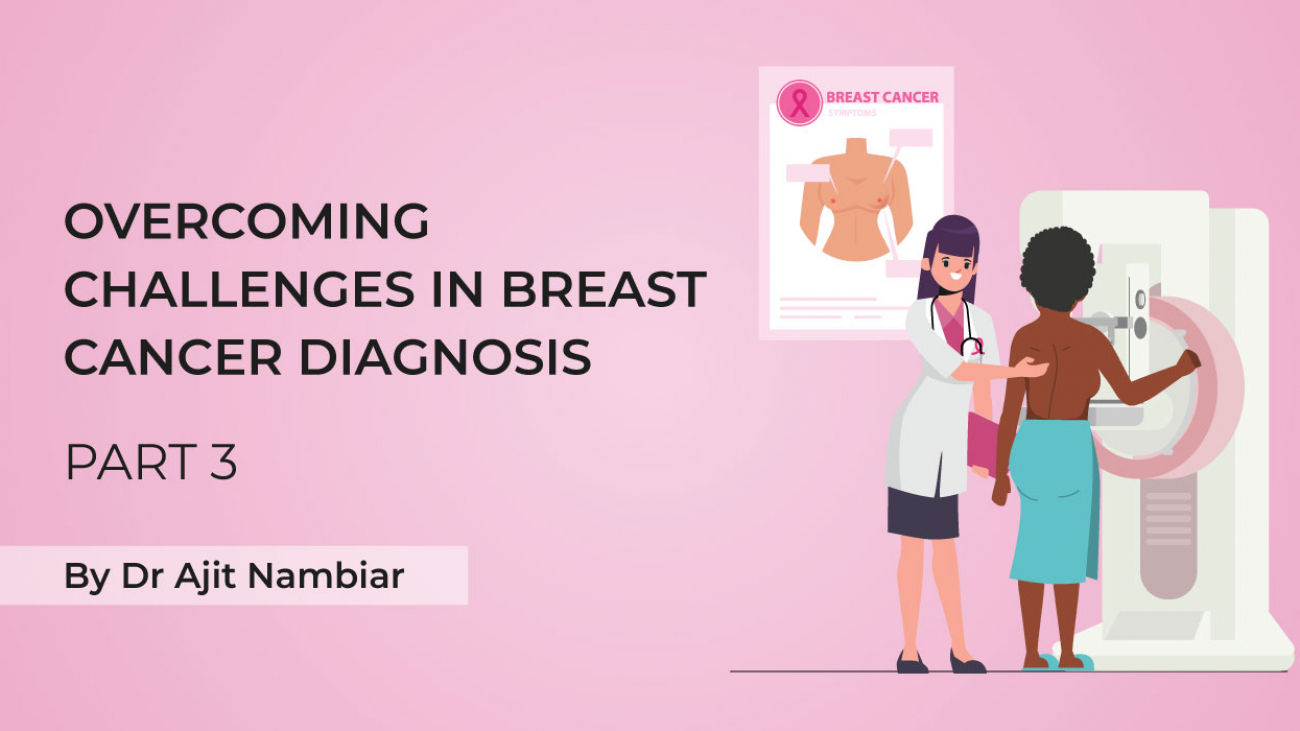Overcoming challenges in breast cancer diagnosis
By Dr. Ajit Nambiar, Director of Lab Services – Karkinos Healthcare, Kerala
PART 3: Overcoming challenges in breast cancer diagnosis
The ethos of early diagnosis through screening is a game changer with a win-win principle. One the cost of treatment and the burden of care in a hospital to country construct will see a decline and more importantly a higher survival curve for the patient. It means a behavioral change from concept of illness to concept of wellness. This is a proven science in the developed world with a shear focus of shifting detection of cancer to earlier stage. With breast as the commonest cancer site in women world over, India needs to get this strategy right. Early diagnosis is equal to cure and therefore breast screening in this country need to help play a big role in bringing majority of the population into stage 1 and stage 2. 100% survival in stage 1 to around 90% in stage 2 drops to 60% in stage 3 and falls to as low to 20% in stage 4.
The risk stratification of women, post a well-defined questionnaire, can help sieve out women who would need further care. The self-breast examination complemented with clinical breast examination is the best economical way to address the breast cancers in the country. This has to supplemented where ever necessary with mammography and BRCA analysis. The ability to provide that care through detection centers, mobile vans, and by using technology through telemedicine could help intensify efforts in the face of increasing incidence of breast cancers.
Triple negative breast cancers unlike the west account for 25 to 30% of breast cancers in the country. This is a heterogenous category and needs further understanding to help provide the better targeted treatment strategies. The triple negative group is notorious for both early breast cancer and has the BRCA subgroup within. Also, importantly this group has the interval cancers as the biology can be really bad with cancers propping up in less than 6 months which makes it difficult for screening done every 2 years to pick up. Possibly certain groups may need more rigorous screening but all that adds to the burden of planning for screenings in this country which unfortunately is at very nascent stage. We need proper focused approach and collective efforts with effective efficient partnerships solve the challenges we face.
Analysis of BRCA in this country also is not without the challenges of cost involved but more than that about the social impacts. Conservative and work by some teams in hereditary cancers in this country place the BRCA load around 20% of all breast cancers. This is a higher number than usual 10% we place on familial cancers in any site in general. But the larger impact it does on mindsets of family as a negative statement and on the next generation from marriageable issues cannot be taken lightly. All genetic tests need provision for pre and post genetic counselling.
Classification of breast based on surrogate immunohistochemistry is reaching nearly two decades of practice. We realize each of major subgroups of hormone receptor, HER2 overexpressed and triple negative are a heterogenous group. Further, substratification is needed from prognostic, predictive, and therapeutic viewpoints. Clinical questions posed on recurrence of disease and possibilities of changing approaches in treatment need to be explored. Molecular and digital AI/ML pathways to make that distinction will need to be pursued more rigorously and that journey will need to be more dynamic with massive scaling and collaborations.
The heterogeneity of breast cancers makes them both a fascinating and challenging solid tumor to diagnose and treat. Detection and validation of biomarkers to aid treatment decisions has always been a challenge. In a cost constrained environment and aware of growing incidence of breast cancers, rationalizing testing algorithms is need of the hour. The cancer cell is rogue and a smart cookie and is trying to outsmart human efforts to tame it. The challenge of tumoral heterogeneity and epigenetic alterations with their impacts on disease progression need to be understood well especially with respect to development of mechanisms to resistance to therapies.
We as a community need to work together and not just brace it but contribute to the dawn of new innovative and creative thoughts to cancel and checkmate cancer and overcome the challenges for a better tomorrow.
About Dr. Ajit Nambiar, MD DNB FRCPath (UK), Fellowship in Surgical Oncopathology (TMH)
Director of Lab Services – Karkinos Healthcare, Kerala

 Dr. Ajit Nambiar, trained at Tata Memorial Hospital (TMH) and Imperial Trust, UK, was Professor & HOD of Pathology, Amrita Institute of Medical Sciences, Kochi.
Dr. Ajit Nambiar, trained at Tata Memorial Hospital (TMH) and Imperial Trust, UK, was Professor & HOD of Pathology, Amrita Institute of Medical Sciences, Kochi.